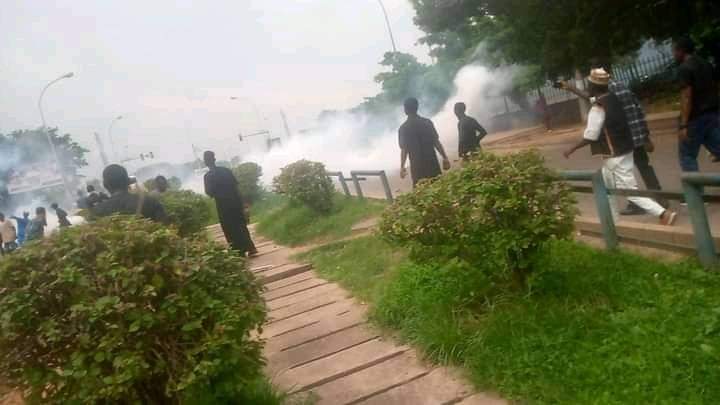————————————————
Islamic Human Rights Commission
————————————————
25 July 2003
Briefing: Bannings and Deportations in the Pacific: racial and religious profiling in Fiji and American Samoa
August 2002 witnessed the US territory of American Samoa, a Pacific island, issue a widespread ban on Muslim visitors from over 23 countries. This discriminatory ban was prompted by the closure island’s US consulate on undisclosed ‘security’ grounds following a visit to American Samoa by a Fiji-based Islamic cleric, Sheikh Abdul Majid, himself deported by the Fijian authorities in February 2003.
Mass entry bans in American Samoa
Following an August 2002 trip to American Samoa by Sheikh Abdul Majid, director of the Islamic Institute of the South Pacific, based in the Fijian capital, Suva, along with an official of Saudi Arabia’s Department of Tourism and Culture, the island’s American consulate was closed. It was later revealed that the consulate closure was prompted by a terrorist alert arising from two unidentified men of ‘Middle-Eastern’ appearance seen taking photographs of the American consulate. Detractors of the claim assert that the two unidentified men were American citizens of Samoan descent, whilst Sheikh Abdul Majid later claimed that his visit to American Samoa was part of an overall tour of the Pacific’s various Muslim communities.
Following the August 2002 visit by Sheikh Majid and his companion, American Samoa’s Attorney General imposed what amounts to an effective ban on visitors to American Samoa from predominantly Muslim countries. Under the discriminatory move, in the form of overtly strict visa entry requirements on nationals form 23 countries, of which 19 are Muslim, visitors are required to obtain the Attorney General’s specific approval in order to enter American Samoa.
Fiji, the only Pacific country on the list, was included on the basis of its substantial Muslim population. American Somoa’s then governor, Tauese Sunia, justified the inclusion of Fiji on the grounds that some Fijian Muslims have studied in Islamic institutions in Muslim countries.
Following the closure of the American consulate, Tauese Sunia stated:
“On learning of that threat, we immediately issued an immigration alert heightening scrutiny for entry into the territory of individuals of Middle Eastern descent and features”.
Fiji Deportation
On 21 February 2003 Sudanese-born Sheikh Majid was expelled from Fiji, despite being resident in Fiji for 18 years. Fijian authorities, acting on US and Australian “intelligence”, claimed that Majid represented a security threat, despite non-disclosure of the alleged evidence.
Following Majid’s expulsion, on March 3 the Fiji Foreign Minister signed an “anti-terrorism” pact with the Australian government.
Other concerns surrounding Fiji’s Muslims:
Fiji’s Muslims, 60,000-64,000 strong, form an estimated 8% of Fiji’s population and is mainly drawn from Fiji’s Indian community (hereafter referred to as Indo-Fijians).
Fiji’s Muslims, exclusively of Indo-Fijian stock, are often subjected, along with Indo-Fijian Hindus, to racial violence and discrimination. The Fijian constitution is racially bias to the advantage of the predominately Christian indigenous Fijians. Indeed post-independence Fiji had been wracked by racial conflict between indigenous Fijians and Indo- Fijians. In May 2000 indigenous rebels launched a coup against Fiji’s first majority Indo-Fijian cabinet.
In 2002 Muslim civil servants in the Revenue and Customs Authority were ordered to shave off their beards. In February 2003 a college banned students from wearing religious symbols, affecting female Muslim students who don the ‘hijab’ (Islamic headscarf).
Australia’s regional role
Recent events in American Samoa and Fiji have been the direct result of US and Australian pressure.
Australia, under the leadership of John Howard, has taken a more interventionist role in South East Asia and the Pacific. This is evident in Australia’s East Timor intervention in 1999 and its spoken post-Bali willingness to engage in pre-emptive strikes against perceived regional threats, terrorist or otherwise.
The Australian government has made clear its regional focus on terrorism in South East Asia and has recently sought to bear pressure on South Pacific states. This is evident both in the March anti-terror pact between Fiji and Australia and the January/February announcement by the Australian-influenced Pacific Islands Forum of a commitment to a tougher regional stance on terrorism and immigration.
The Fiji deportation and American Samoa bans, along with the Indonesian government’s military action in Aceh, demonstrate Australia’s willingness to support increasingly repressive governments.
IHRC Condemns Religious and Racial Profiling
IHRC points out that the Pacific region has never experienced any “Al-Qaeda” activity or any movement that resembles supposed “Islamic fundamentalism”. No proof exists as to their possible existence in any Pacific country. The bans and deportation, apart from betraying unjustified hysteria over the threat Al-Qaeda poses demonstrates unrestrained religious and cultural prejudice at its worst.
IHRC unreservedly condemns American Somoa’s religiously and ethnically motivated ban on visitors from mainly Muslim countries. Not only does it clearly violate international law, but directly contravenes the US constitution which American Samoa is supposed to uphold. Furthermore, it potentially discriminates against US citizens who are from Muslim backgrounds and with ethnic origins in those countries subject to this racist ban. IHRC calls upon the US government to pressure the American Samoan administration to immediately rescind its ban and issue an apology to those affected.
IHRC also condemns the Fijian government’s deportation of Sheikh Majid, given his 18 years of residence in the country. IHRC feels that its willingness to succumb to US and Australian pressure has human rights implications for the country’s Muslim population. This is not withstanding the intense constitutionally-driven state racism Fijian Muslims endure on account of their mainly Indian origins. IHRC seeks the removal of all discriminatory clauses in the Fijian constitution and calls for racial parity in Fiji’s public affairs.
Concerns regarding Australian intervention
IHRC takes this opportunity to express its concerns at Australia’s increasingly “aggressive” role in the Pacific and South East Asia, following John Howard’s post-Bali comments that Australia is prepared to engage in pre-emptive attacks and or intervention against perceived regional threats.
IHRC fears that Australia, like the US, is undermining international conventions and norms (especially those pertaining to human rights) and that any form of unilateral action is without international or regional support. IHRC believes that the recent Canberra-lead intervention in the Solomon Islands strengthens this concern and further Australian intervention or pre-emptive engagement can only destabilise the region and augur ill for the human rights of its inhabitants.
For more information please contact:
Islamic Human Rights Commission
PO Box 598
Wembley
HA9 7XH
United Kingdom
Telephone (+44) 20 8902 0888
Fax (+44) 20 8902 0889
Email info@ihrc.org
Web www.ihrc.org





